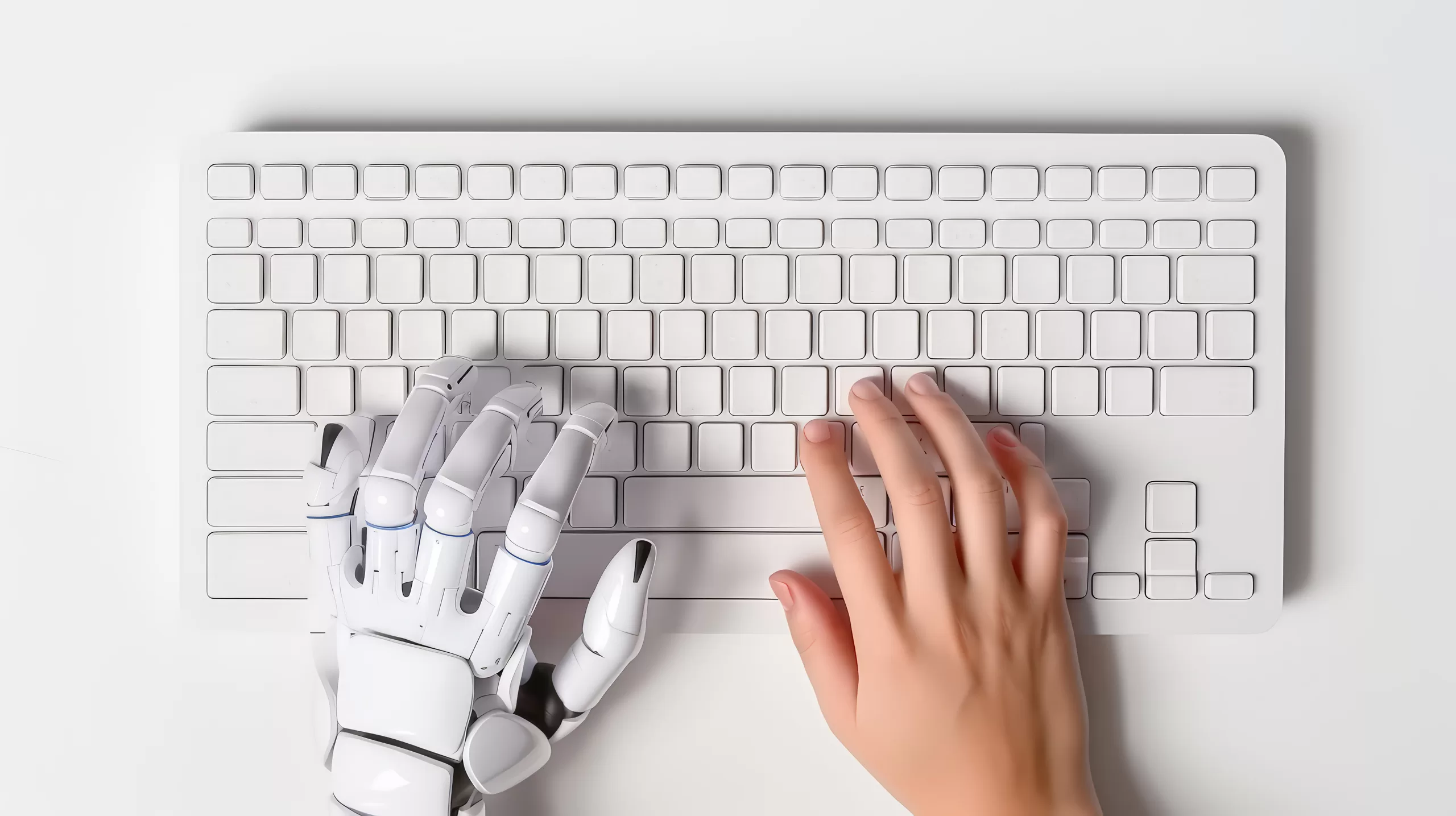It’s hardly surprising that AI is a hot topic in talent acquisition. The global AI recruitment market reached $610 million in 2021 and is projected to hit $890 million by 2028. Momentum is quickly growing. A 2024 Gartner survey showed that “38% of HR leaders are piloting, planning, or have already implemented generative AI (GenAI), up from 19% in June 2023.”
However, not all AI recruitment solutions are created equally.
For instance, consider the recent example where applicants of massive companies reported being subjected to a “bizarre,” “insulting,” and “frustrating” personality test. This AI-powered test featured “weird” blue humanoids and presented candidates with a variety of situations and questions to gauge their fit. While employers believed this test would help them find qualified candidates faster, applicants found the test “prejudicial,” “frustrating,” and “unrepresentative” of their actual personalities.
AI is transforming recruitment by speeding up time-consuming tasks and improving the quality of new hires. To ensure fairness, recruiters must use this technology to create an equitable candidate experience.
This blog examines the use of AI in recruitment, discussing its benefits and potential drawbacks.
Table of contents
How Is AI Being Used in Hiring Today?
Traditional hiring methods, like reviewing resumes and arranging interviews, can take up the majority of recruiters’ time, causing delays and potentially frustrating applicants while increasing the risk of losing them to companies with quicker hiring processes. In fact, the average time to hire an employee reached an all-time high of 44 days last year.
Amidst a persistent talent shortage, organizations are receiving more applications than ever. While this gives recruiters more options, it also means there are many more applications to sift through — in other words, more noise.
AI in recruitment can bridge the gap, helping recruiters find qualified candidates faster.
64% of employees struggle to complete work due to a lack of time and energy (Microsoft survey). In light of that, 70% of people would delegate as much work as possible to AI to lessen their workloads.
— Microsoft’s 2023 Work Trend Index Report
Here are several ways AI helps in recruitment:
- Screening resumes. AI specializes in quickly making sense of vast data sets. AI tools scan resumes, match skills to job requirements, and streamline recruitment, finding qualified candidates faster.
- Sourcing candidates. AI tools can actively search for potential candidates across various platforms, including job boards and social media sites like LinkedIn. Recruiters can focus on hiring tasks such as interviewing and communicating with managers, thanks to this efficiency.
- Automating communication. AI-powered chatbots can provide real-time responses or even conduct preliminary interviews. GenAI can also help create templatized emails for personalized candidate outreach.
- Screening candidates for a job. When using any kind of pre-hire assessment, AI can gather and analyze thousands of data points to understand the job-specific context and rank candidates against those specific job requirements.
- Conducting one-way interviews. In addition to automating the scheduling of interviews, AI can also conduct interviews by asking a series of standardized questions, and in some instances, analyzing candidates’ responses.
- Making informed decisions. AI can analyze historical data, forecast future hiring needs, and evaluate candidates to help recruiters make more informed decisions. This helps recruiters make hiring decisions grounded in facts rather than personal opinions.
- Assisting with onboarding. Support new hires with personalized onboarding that incorporates their unique learning styles and populates learning material based on their roles and skills.
- Job descriptions. AI writing tools can help draft compelling job descriptions. Recruiters can get ideas and suggestions to make the language in job postings more appealing, inclusive, and likely to attract a diverse pool of candidates.
How Can AI Improve Hiring?
A 2023 CareerPlug report found that candidates get frustrated when the interview process is slow and disorganized. Recruiters must pay close attention to how they hire people. The key is using the right technologies to improve the hiring process for recruiters and candidates.
We’ve discussed what AI is used for. Here are several of the benefits:
Reduce manual work
The “do more with less” approach is common in talent acquisition (TA), with a majority of HR professionals (57%) working beyond regular capacity, according to a 2023-2024 State of the Workplace Report. AI can reduce the manual load on recruiters, helping them focus on uniquely human, more strategic activities like conducting standardized interviews and making data-driven decisions.
Mitigate bias
Human biases, both conscious and unconscious, can influence decision-making, potentially leading to discrimination, poor judgment, and suboptimal decisions. AI algorithms can be designed to minimize biases and capitalize on merit. For instance, AI can mask demographic information in the hiring process — such as name, age, race, and gender — so everyone gets a more equal opportunity.
Bridge skills gaps
The skills required in the age of AI seem to be changing overnight, with one study predicting that half of all skills that exist today won’t be relevant just two years from now. AI can identify which skills your employees have and forecast which skills they’ll need in the future. It can even help create job-specific learning pathways for employees.
Create recruitment strategies
AI can analyze market trends, salary data, and employee performance to help you make smart hiring decisions.
Reduce turnover
AI can analyze employee surveys and turnover rates to help you create proactive strategies for retaining employees and enhancing overall job satisfaction. With nine in ten organizations worried about keeping their employees, AI has the potential to help develop effective plans to combat turnover.
Risks and Limitations of AI Hiring
Data quality
The quality of AI results depends on the quality of the data used to train the AI models. Weddy Batchelder, SVP and chief data officer at Salesforce, explained it this way: “As companies rapidly embrace AI and realize its benefits, trust must be their top priority. And to instill trust in AI, they must first instill trust in the data that powers it.”
Just consider this cautionary tale from Amazon, whose machine learning specialists built a candidate screening solution to pinpoint ideal software developers. Unfortunately, the training data exclusively featured male software developers. As a result, females were disqualified from the hiring process — resulting in Amazon abandoning the in-house hiring tool altogether.
When choosing an AI recruitment technology, make sure to vet your AI vendor and understand how they built their AI tool, including whether it’s based on the latest industrial-organizational science and what kind of data they used.
The legality of AI in recruitment
Compliance is crucial for HR practices, as it ensures that a company follows laws and ethical guidelines, protecting employees and an organization’s reputation.
However, widespread federal AI regulation around AI is still a ways off, so it’s essential to adopt AI solutions committed to ethical practices to stay competitive and compliant in the long run while benefitting from the advantages of AI.
Make sure your vendor maintains fairness and consistency in their algorithms to avoid problems like legal claims, unfair hiring, and inaccurate employee performance data. Regular updates should also align with evolving legal standards to prevent discrimination concerns.
The need for a human in the loop (HITL)
AI solutions aren’t infallible. In fact, they sometimes generate inaccurate results — or hallucinations. Many candidate screening solutions use AI in one way or another, but the goal of these solutions should never be to remove the human from the equation or replace human judgment. Rather, AI technologies should help recruiters make the most informed decisions possible.
The Future of AI in Hiring
Data powers AI. It should also power our decisions about how and when to use AI. So what does the data tell us about the future of AI in HR?
1. Four in five people want to learn more about using AI in their profession.
This statistic from LinkedIn research indicates that more people want to learn about AI and are willing to improve their skills to keep up with technology and stay competitive in their jobs. Employers should respond by providing programs and resources to meet the rising demand for AI knowledge, including for recruiters and the employees they hire.
2. Some 53% of employees say they don’t feel prepared to work with AI.
It’s essential to provide training and support to make it simpler for new technologies like AI to fit into the workplace. This can boost productivity, innovation, and success in using AI in HR and your business. Considering that only 23% of employees feel connected to their work, finding ways to make them happier is no longer a nice thing but a must-have.
3. More than half of our jobs may be impacted by AI.
This means the skills needed for these jobs will continue to change at a fast rate, up to 65%, by the year 2030.
4. HR decision-makers and recruiters are hopeful about the future of recruiting.
The 2024 investment outlook indicates that over half of the budget increase will go to AI-powered recruiting tools.
This suggests a positive outlook for AI and recruitment, as HR decision-makers and recruiters strongly believe in AI’s potential benefits and impact on hiring.
5. Some 78% of recruiters expect to see an increase in AI in the workplace.
This suggests a strong consensus among recruiters that the importance and usage of AI in HR will only grow.
Interest and optimism are growing year over year among HR decision-makers and recruiters. As the job market keeps evolving, we can expect more AI tools to be used in hiring with the goal of making the hiring process faster, smoother, and more effective.
How Wonderlic Helps with Hiring
Let’s face it. Successful hiring takes time and effort.
Having fewer recruiters, more jobs to fill, and a higher volume of applicants (and more unqualified candidates) means talent teams need concrete ways to do more with less — improving efficiency while minimizing the risk of bad hiring decisions.
Wonderlic Select is a pre-employment test that uses industrial-organizational psychology to measure a candidate’s cognitive ability, personality, and motivation. Essentially, it assesses whether the candidate has the necessary skills to perform the job, how their personality traits may affect their performance, and whether they are naturally motivated to do the work.
We then use AI to make our scoring more job-specific. Knowing the knowledge, skills, and abilities of more than 99% of jobs takes a lot of data, and AI helps us scale our scoring models to account for millions of unique jobs. Recruiters can see a single score for candidates that shows how well they match a role, and if they want to explore further, recruiters can deep-dive into individual elements of the Wonderlic assessment to see why candidates scored a certain way.
Wonderlic provides an accurate measure of how a person will perform. If you aren’t using psychometric assessment for hiring, you don’t know who you are going to get.
David Rice, Operations VP at Savannah Luggage Works
By narrowing recruiters’ focus to best-fit candidates, Wonderlic has helped customers reduce screening time by up to 75%. Recruiters can use that time to look deeper into resumes, screen candidates via phone calls, and conduct standardized interviews, all to find the right hire the first time, every time.
See how Wonderlic can help you find the right candidate for every role. Schedule a demo today.
Frequently asked questions:
How is Artificial Intelligence (AI) utilized in the recruitment process?
Artificial intelligence (AI) can be utilized in various stages of the hiring process, such as screening resumes, evaluating job applicants through job-specific psychometric tests, and assisting recruiters in finding and hiring qualified candidates. However, it is important to note that not all AI solutions are created equal. While some AI-powered solutions help eliminate bias, others can create it, which makes it crucial to choose the right AI solution for your hiring needs.
What is the future of AI in recruitment?
AI for hiring is here to stay. Research shows that adoption is increasing with HR leaders viewing AI as a way to help recruiters do more with less and find qualified talent faster.
Is AI replacing HR?
AI won’t replace workers in HR; a human in the loop is essential to making good hiring decisions. AI will, however, help recruiters focus on the uniquely human elements of recruiting, such as building relationships with applicants, partnering with hiring managers, and helping people find great jobs.
What is responsible AI for recruitment?
Recruiting with responsible AI involves using unbiased algorithms and quality data to promote equity and equality.
Responsible AI also includes the ethical and lawful collection, storage, and utilization of candidates’ data, ensuring privacy and compliance with relevant laws and regulations.






